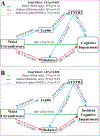Mediation effects of diabetes and inflammation on the relationship of obesity to cognitive impairment in African Americans
- PMID: 35941823
- PMCID: PMC9639783
- DOI: 10.1111/jgs.17985
Mediation effects of diabetes and inflammation on the relationship of obesity to cognitive impairment in African Americans
Abstract
Background: Whether diabetes and adipokine-driven inflammation explain the association of obesity to cognitive impairment is unknown.
Methods: Structural equation models estimated the total effects of waist circumference on cognitive outcomes among African American participants cross-sectionally (index exam) and longitudinally. Total effects were deconstructed into direct pathways of waist circumference to cognitive impairment and indirect mediation pathways through leptin, soluble tumor necrosis factor receptor 2 (sTNFR2), and diabetes. Waist circumference, leptin, and sTNFR2 were standardized. Cognitive impairment was defined as MMSE <21 or a z-score < -1.5 standard deviation (SD). Incident cognitive impairment was defined among those without cognitive impairment at the index exam as follow-up MMSE<21, z- score < -1.5, MMSE decline >1 point/year, or z-score decline of >0.1 SD/year.
Results: Among 1008 participants (70% women, mean age 62.9 years, 14.5% with obesity, 26% with diabetes), 132 (13%) had baseline cognitive impairment. Each SD higher waist circumference was associated with higher odds of cognitive impairment, odds ratio (OR) = 1.63; (95% confidence interval: 1.17, 2.24), with mediating pathways explaining 65% of the total effect (58% from diabetes; 7% from inflammation). At follow-up (mean 6.8 years), 106 of 535 (19.8%) had developed cognitive impairment. Each SD higher waist circumference was associated with higher odds of developing cognitive impairment (OR = 1.87; 95%CI: 1.18, 2.74); the direct effect of waist circumference explained 37% of the total effect and mediating pathways explained 63% (61% from diabetes; 2% from inflammation), although individual pathways were not statistically supported in the smaller sample.
Conclusion: Diabetes, and to a lesser degree, adiposity-driven inflammation, appear to explain a substantial proportion of abdominal adiposity relationships with cognitive impairment. The impact of preventing and treating obesity on cognitive outcomes merits study.
Keywords: cardiovascular; cognitive aging; health disparities.
© 2022 The American Geriatrics Society.
Conflict of interest statement
Conflict of Interest
None
Figures
References
-
- Gaskin DJ, LaVeist TA, Richard P. Key Findings and Policy Recommendations: The Costs of Alzheimer’s and Other Dementias for African Americans. Report. The African American Network Against Alzheimer’s 2013:1–20. January 1, 2014. Accessed September 01, 2021. https://www.usagainstalzheimers.org/reports-research
-
- Stewart R, Masaki K, Xue Q-L, et al. A 32-Year Prospective Study of Change in Body Weight and Incident Dementia: The Honolulu-Asia Aging Study. Arch Neurol. January 1, 2005. 2005;62(1):55–60. doi:10.1001/archneur.62.1.55. doi:10.1001/archneur.62.1.55 - DOI - DOI - PubMed
Publication types
MeSH terms
Substances
Grants and funding
- R01 NS041558/NS/NINDS NIH HHS/United States
- 5U54GM115428/GM/NIGMS NIH HHS/United States
- 1R01AG066914/AG/NIA NIH HHS/United States
- R01 HL085571/HL/NHLBI NIH HHS/United States
- P20 GM121334/GM/NIGMS NIH HHS/United States
- R01 HL092577/HL/NHLBI NIH HHS/United States
- U01 HL054463/HL/NHLBI NIH HHS/United States
- R01 AG066914/AG/NIA NIH HHS/United States
- National Institutes of Health, and the Memory Impairment and Neurodegenerative Dementia (MIND) Center at the University of Mississippi Medical Center
- R01 AG054787/AG/NIA NIH HHS/United States
- R01 AG066010/AG/NIA NIH HHS/United States
- U54 GM115428/GM/NIGMS NIH HHS/United States
- R01 AG045255/AG/NIA NIH HHS/United States
LinkOut - more resources
Full Text Sources
Medical


